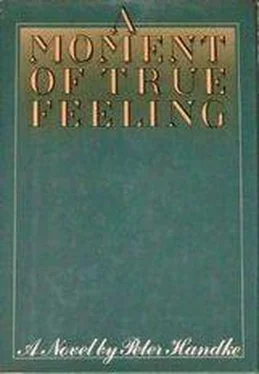What a strange day it was! He couldn’t walk, he was running again. He should have been home at nine. He wouldn’t make it on time, ahead of the Austrian writer, unless he took a cab. But then he thought: I’ve got to experience something more, and stopped in front of the chestnut tree, suddenly taking a great liking to this tree with the still-bright strip of sky behind it. I’ve earned the right to look at it, he thought, and cast a long look at its flapping leaves. — He would experience more in a bus than in a cab. So he went over to the Avenue Gabriel and took the 52 bus, which runs from the Opera to the Porte d’Auteuil.
On the bus he thought: Maybe, if I feel as though I hadn’t experienced anything in a long time, not until last night at least, it’s because I had decided in advance what an experience is. As in a travel prospectus, a mere object stood for experience. According to the prospectus, “the campfire will be an experience”—and to my mind the water flowing in the gutter, the soft-smooth surface of the shoe polish in a new can, a freshly made bed, an elderly person who had preserved his curiosity represented experience. — I must get over needing guarantees of experience, he thought.
In the bus he was alone with a North African worker. The North African was drunk. The bus was going fast, because there was no one waiting at most of the stops. When the driver took the sharp turn into the Avenue Friedland without slowing down, the man vomited in the aisle. The driver pulled up at the curb and without a word opened the door. The drunk spoke loudly in his own language, but without turning toward the driver. Keuschnig pretended to be looking out of the window. Not one of the three in the bus looked at either of the others. The North African began to shout. The driver turned off the motor. It’s too late to say anything now, Keuschnig thought. Suddenly he noticed that the drunk was looking at him and speaking to him. He looked back blandly at him as if nothing were wrong. The North African fell silent and got out. The bus drove on. The driver didn’t say a word, he seemed to need no backing up. When Keuschnig looked at the splattered vomit on the floor, glistening in the harsh white overhead light, he felt it was meant for him. — At the next stop he left the bus, long before Auteuil. In getting out, he said to the driver: “Monsieur, vous n’êtes pas gentil, ” but the words didn’t come out right.
The drunk had vanished. By then Keuschnig only felt sorry for him; before, he had also regarded him as a nuisance. If he hadn’t been abusive, I’d have helped him, he thought. But because he was angry and stood up for himself, I stopped feeling sorry for him. How could I be so unreasonable? Was I only sorry for myself as I used to be — did I, at the sight of that humiliated man, remember the child who let himself be humiliated without a murmur? — He had witnessed a humiliation; as a witness he felt that he himself had been surprised in a humiliating situation. Keuschnig fled. He ran down the steps of the nearest Métro station, changed at TROCADÉRO, and then at last, bound for home on good old Line 9, he felt free from persecution.
Without expressly thinking of it, he felt the varying distances between stations in his whole body. As usual, the distance between RUE DE LA POMPE and MUETTE seemed so long that he was surprised at MUETTE not to be a station farther on; and today as usual, between JASMIN and MICHEL-ANGE-AUTEUIL, he automatically went to the door too soon, though the train was only slowing down for a curve. — When at last the letters MICHEL-ANGE-AUTEUIL appeared white on blue, they struck him as the goal of a long arduous journey. — A good many things were as usual. But he wasn’t thinking of that any more, he only sensed it in a remote compartment of his mind. As though something depended on it, he tried, in throwing away his used ticket, to make sure it fell into the waste bin. It missed … Already at the gate, he retraced his steps, picked up the ticket, and kept tossing it until it landed in the bin.
By then he was almost home. He took a detour across the Place Jean-Lorrain, where a market was held three days a week. The square was deserted. In the middle there was a small fountain, from the top of which a jet of water flowed into a little basin. The jet was so round, so clear, that Keuschnig put his hand in to break its flow. The leaves of plane trees lay on the asphalt and around their edges the otherwise dry ground was still moist. It was getting dark. The sky, which had kept some of its light, was reflected only in the oily water that had settled in the holes from which the market stanchions had been removed. A cyclist with purring generator turned into a side street. Keuschnig saw the greatly enlarged shadows of coats on the curtain of a restaurant window. The water in the gutter had flowed off, and here and there a sparrow was drinking from the little puddles that remained. Suddenly Keuschnig remembered a bird which had been flying back and forth in a Métro entrance earlier that day. He raised his eyes and saw the searchlights from the far-off Arc de Triomphe playing through the now dark sky. Then with downcast eyes he walked past the house fronts which concierges had scrubbed almost white but which more dogs would piss on, day in day out.
Keuschnig stopped at the door to his house, feeling sick to his stomach because he didn’t know how to act or in what order he should do things. It was beyond him how he had found his way home every day, why he hadn’t ever vanished on the way. Why today, while still in the Métro, had he held his door key in anticipation? Before going in, he thought, I must mentally rehearse the things I’ll have to do. First, in any event, deposit his attaché case in the hallway. Then it was to be hoped (rather than feared as in the fairy tale) that the child would be first to cross his path and that he’d be able to stay with her awhile as a pretext. If the child didn’t appear (because she had already gone to bed) he would quickly put on an appropriate face and, avoiding superfluous motion — like the flower girl — go in to the people. — He had no feeling of anticipation, he wasn’t looking forward to seeing any of them. The closer he came, the less he felt in common with them. While turning the key, at first purposely in the wrong direction, and clearing his throat, he felt as if he were approaching a stone wall incised with ancient and now illegible hieroglyphics. In a moment he would hear the question: “How are you?” and wouldn’t even be entitled to punch the asker. He moved his chin from side to side, relaxed his muscles, and put on an anticipatory smile, in order to seem, if only deceptively, like himself.
The distances in the apartment were so great that before he got to the salon he fell out of his role. His face went blank, and he had to work up a smile again. When he tried to shake hands with the writer’s girl friend, he missed his aim and caught only her little finger, which he shook. He missed again when his wife proffered first one cheek, then the other, as she had seen Frenchwomen do. Why was she wearing that blouse with a necktie of the same material again? Why was she wearing that skirt with the slit on the side? Simultaneously with these thoughts, he asked: “Where’s Agnes?” “She wanted to wait for you,” said Stefanie. “But she got so tired waiting …” “I know,” said Keuschnig, who couldn’t bear to hear her finish a sentence when he knew the end in advance. Involuntarily, he turned the loaf of bread in his hand, revealing the place where he had bitten into it. The writer took out a notebook, wrote something, and smirked. Why was Stefanie sitting in her hostess attitude, hand to cheek, and elbow resting on the palm of her other hand? “I’ll go and see if she’s still awake,” said Keuschnig, eager to turn his telltale face away from the writer. “But don’t wake her if she …” He interrupted Stefanie by bending down over her blouse as if he had seen a thread on it. Why was she always talking needlessly?
Читать дальше












